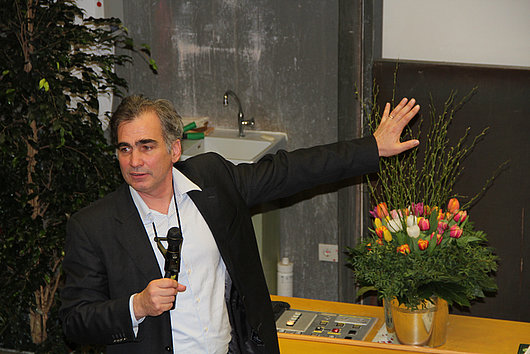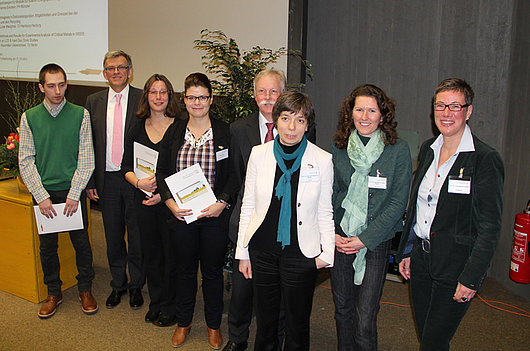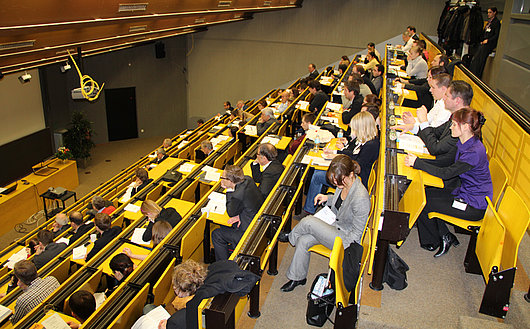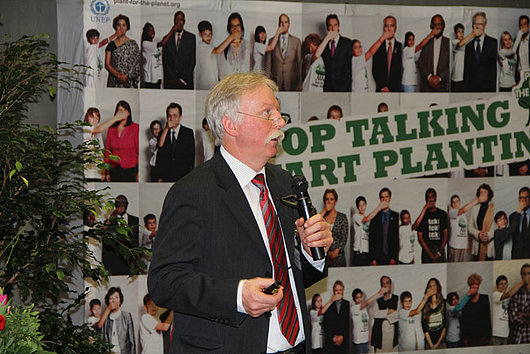
3. Wissenschaftskongress „Abfall und Ressourcenwirtschaft“ 2013, 21.-22. März 2013 in Stuttgart
The 3rd Scientific Congress "Waste and Resource Management" took place in March 2013 under the direction of Prof. Dr.-Ing. Martin Kranert at the University of Stuttgart. The almost one hundred participants were welcomed to the event by Prof. Dr.-Ing. Gerhard Rettenberger on behalf of the DGAW e.V.
For the first time this year, there was a keynote speech at the beginning of the event. Frithjof Finkbeiner, from the Global Marshall Plan Initiative, introduced the Plant for the Planet project to those present. Finkbeiner argued that it is particularly important in times of globalization that each individual fulfills their social responsibility: "Plant trees because that is the easiest way to reduce CO2! If every person planted just 150 trees, that would be a total of 1,000 billion trees." Numerous participants took the opportunity to make a tree pledge during the science congress. You can find more information about this initiative here.

A total of 22 speakers presented papers on the topics of plastics recovery, biological processes, international waste and resource management, recycling, thermal recovery and logistics.
As in previous years, the congress was also accompanied by a poster exhibition. This also gave young scientists the opportunity to present their current research work to an interested specialist audience.
At the beginning of the second day of the congress, Ministerial Director Helmfried Meinel (Ministry for the Environment, Climate Protection and the Energy Sector Baden-Württemberg) awarded three scholarships thanks to the generous support of the ministry and numerous other sponsors. This year, Elisa Seiler (Fraunhofer ICT), Maksim Akhmadiev (University of Perm, Russia) and Agata Rymkiewicz (University of Stuttgart) received funding. Ms. Seiler received a grant of 3,000 euros to fund her doctorate on the topic of "High-quality utilization of fiber composite components from wind turbines". Mr. Akhmadiev is investigating the development of biotechnological processes for the remediation of contaminated sites and will receive a scholarship of 2,500 euros. Ms. Rymkiewicz, who is doing her doctorate on the spatial modelling of waste management data in urban centers, will receive a grant of 1,500 euros. Her case study focuses on the Ethiopian capital Addis Ababa.

Furthermore, a jury of the Advisory Board selected the winners of the Science Prize for Waste and Resource Management in the categories "Lecture" and "Poster". In the "Poster" category, the Science Prize for Waste and Resource Management and a cash prize of 500 euros were awarded to Christian Wolf from the Cologne University of Applied Sciences for his work entitled "Optimizing the operation of waste fermentation plants using online measurement technology and data analysis". In the same category, Helmut Adwiraah from the Technical University of Hamburg-Harburg was also awarded for his work "Foliage as a substrate for fermentation - potential study for Hamburg deciduous trees" and Benjamin Brinkmann from the University of Duisburg-Essen for the poster "Energetic optimization of biowaste recycling in a fermentation plant based on material flow separation into a solid and liquid phase".

The Science Award for Waste and Resource Management for the best lecture and a cash prize of 1,000 euros went to Ann Sophie Kitzler from Hanover University of Applied Sciences and Arts/University of Rostock for her lecture entitled "Cascade utilization of biopolymers - basic investigation into the disposal of biopolymers". Marko Burkhardt from BTU Cottbus for his presentation entitled "Combined material and energy recycling of incontinence material" and Kathrin Weber from RWTH Aachen University for her presentation entitled "Influencing the ash melting behavior of biogenic residues through leaching and additivation".
The congress ended on March 22, 2013 with closing remarks by Prof. Wolfgang Klett, Vice President of DGAW e.V. and Prof. Martin Kranert (University of Stuttgart).
The next Science Congress will take place on March 27 and 28, 2014 under the direction of Prof. Dr.-Ing. Sabine Flamme at Münster University of Applied Sciences.
Contributions to the congress:
Part 1 Plastic recycling
- "Influence of biodegradable plastic bags on GHG emissions during the composting of organic waste"
Dipl.-Ing. Oliver Larsen, TU Berlin
- "Cascade utilization of biopolymers - Basic studies on the disposal of biopolymers"
Dipl.-Ing. (FH) Ann-Sophie Kitzler, University of Applied Sciences and Arts Hanover/University of Rostock
- "Combined material and energy recovery of incontinence material"
Dr.-Ing. Marko Burkhardt, BTU Cottbus
- "Economic perspectives of the processing of plastic concentrates from mixed residual waste with the aim of recovering product streams for mechanical recycling"
Holger Giani, RWTH Aachen University
Part 2 Biological processes I
- "Carbon fixation in compost through microbial carbonization"
Dipl.-Ing. Claus-Robert Wonschik, HS Harz
- "Regionally adapted concepts for plants for the production of a soil conditioner from organic residues with Terra Preta properties"
M. Sc. Jakob Hildebrandt, Trier University of Applied Sciences
- "Waste technology expansion of biowaste treatment plants for the production of bio-based products"
Dr.-Ing. Marc Hoffmann, TU Darmstadt
- "Micro- and molecular biological methods for the quantitative and qualitative determination of influencing variables of biological methane oxidation"
M. Sc. Tobias Gehrke, Univ. Duisburg-Essen
Part 3 International waste and resource management
- "Evaluating Investment Opportunuties in the Municipal Solid Waste Management Market in India - A Case Study"
Benjamin Borngräber, Brucerius Law School/WHU
- "GIS Based Modeling of Waste Management Data in Urban Areas, Case study of Addis Ababa, Ethiopia"
Dipl.-Geogr. Agata Rymkiewicz, University of Stuttgart
- "Remediation of soil contaminated with oil products using the biotechnological process"
Maksim Akhmadiev, University of Perm (Russia)
- "Model-Based Strategic Planning for Sistainable Waste and Residual Resource Management in Urban Centers in Low and Middle Income Countries"
M. Sc. Nicolas Escalante, Univ. Stuttgart
Part 4 Recycling
- "Recycling strategies for modules for solar energy generation"
M. Sc. Katharina Eckstein, FH Münster
- "Permanent magnets in small electrical appliances. Possibilities and limits of collection and recycling"
Dipl.-Ing. Luise Westphal, TU Hamburg-Harburg
- "Differing Methods and Results for Experimental Analysis of Critical Metals in WEEE: Reflection on LCD & Hard Disc Drive Studies"
Dipl.-Ing. Maximilian Ueberschaar, TU Berlin
Part 5 Biological processes II
- "Biogas production from biofuel production residues - Influence of trace elements on the increase of organic pollution"
Dipl.-Ing. Thomas Schmidt, University of Rostock
- "Investigation of the occurrence and prevention of pathogenic clostridia in fermentation substrates"
M. Sc. Beatrix Lüdecke, University of Rostock
- "Investigation of the bioavailability of trace elements in biogas plants"
Dipl.-Ing. Adam Feher, HAWK Hildesheim, Holzminden, Göttingen
- "Model development for the quality assessment of green waste for biogas production"
Dipl.-Ing. Saskia Oldenburg, TU Hamburg-Harburg
Part 6 Thermal utilization and logistics
- "Further development of an automatic sampler for the quality assurance of heterogeneous substitute fuels"
M. Sc. Ann Katrin Steinhoff, Münster University of Applied Sciences
- "Influencing the ash melting behavior of biogenic residues through leaching and additives"
Dipl.-Ing. Kathrin Weber, RWTH Aachen University
- "The Tray Cycling - Logistics for Urban Mining (TraCy) project. From waste disposal company to raw material supplier - a view from the perspective of supply chain management"
M. Sc. Michael Morch, Fraunhofer IML Dortmund

